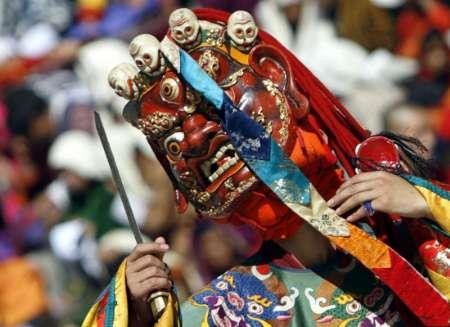
It is 20 March again. Shall we celebrate the second ever International Day of Happiness?
For the world that has always been basking in the glory of economic prosperity and material gain and measuring the substance of growth only in terms of 'Gross Domestic Product' (GDP), it is hard to imagine the possibility of looking at progress through the perspective of people's happiness.
Proudly touting the concept of Gross National Happiness, the tiny Himalayan Kingdom of Bhutan has been following an uncanny government policy that aims to strike a fine balance between material gain and spiritual values. The kingdom has asserted that this is the only way forward to impart real happiness in citizens.
The fourth King of Bhutan, Jigme Singye Wangchuk, often credited for many modern reforms in the country, originally came up with the concept when he was crowned in 1972. The 'Dragon King', who abdicated his throne in 2006 and gave it to his son, will always be remembered in the world as someone who propagated the idea that government policies should aim towards imparting happiness and well-being to people and not just producing materials, indicated by the narrow economic concept of GDP.
Even as the concept of being able to measure the happiness of people has met with many skeptic minds in today's scientific and realistic world, governments across the world have often conceded of having faced much betrayal from GDP. Leaders, economists and social scientists all alike have long been paying attention to the eccentric philosophies stemming from this otherwise reclusive landlocked nation.
International movements and policy developments are underway in full swing in many countries frantically seeking to measure progress through the newly founded metrics that incorporate well-being and happiness.
Bhutan has been trying in earnest, except in recent days, to build what has been called Gross National Happiness Index, a comprehensive method of measuring happiness in people using nine different domains: Psychological well-being, health, education, time use, cultural diversity and resilience, good governance, community vitality, ecological diversity and resilience, and living standards.
Five years after the fourth king abdicated his throne, a Bhutanese survey that used the method of GNH index found that 41 percent of people in Bhutan were happy after they attained sufficiency in two-thirds of indicators (there are 33 indicators under those nine domains). The survey showed that only 10 percent were unhappy.
As the country was slowly getting recognized in the world as the creator of a brilliant happiness idea, the year 2011 saw a historic event in the nation's history. Bhutan sponsored UN resolution 65/309 called 'Happiness: Towards a holistic Approach to Development,' a concept that categorically renounces GDP as an inconclusive yardstick to reflect happiness. The country boldly declared that a more balanced approach was needed, based on an amalgamation of economic prosperity and spiritual values.
The UN General Assembly adopted the resolution and Bhutan hosted a meeting in the spring of 2011 in New York City publicizing the well-being indicators and the concept of GNH, an event that attracted as much as 800 enthused audiences and merited an unanimous applaud.
Although the present government headed by Prime Minister Tshering Tobgay is less interested in propagating this concept at a time the country is going through the worst economic crisis due to limited supply of Indian Rupees, the country is nonetheless, often hailed for coming up with the idea.
The nation is in fact, so widely felicitated for the holistic approach towards development, that governments across the globe often ignore the small dent that Bhutan suffers for producing one of the highest number of refugees in the world in comparison to its total population. Nearly 80,000 of its southern ethnic Nepali-speaking minorities had to flee the country in early 1990's repressed by the country's policy of 'one nation one people' that enforced the rule to dress, speak and indeed be like those from Northern Bhutan.
In what has been widely perceived as betrayal, Bhutan itself shifted the date for 'Happiness Day' to 11 November coinciding with the birth anniversary of the fourth king, known as the 'Druk Gyelpo' in colloquial terms.
The day will however, be celebrated across the nations on 20 March every year. It is also interesting to note, more importantly, that many countries in the world, including Canada, France and Britain have already added measures of happiness to their national statistics impressed by the concept of Gross National happiness brought forth by this tiny nation in the Himalayas that is often referred to as the last surviving 'Shangri-La' and one of the happiest nations in the world.















